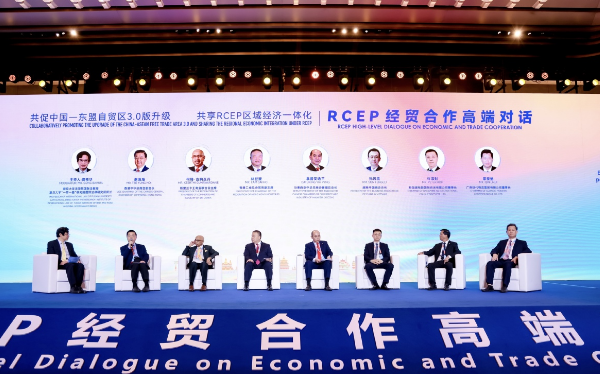RCEP High-Level Dialogue on Economic and Trade Cooperation held in Guangxi

The RCEP High-Level Dialogue on Economic and Trade Cooperation was held on Monday during the 21st China-ASEAN Expo in Nanning, Guangxi Zhuang autonomous region. [Photo provided to chinadaily.com.cn]
Cooperation among the Regional Comprehensive Economic Partnership countries will continue to flourish and create benefits for the people of the region, a forum in Southwest China's Nanning heard on Monday.
RCEP allows the Association of Southeast Asian Nations to progress towards a new level of regional economic integration, laying the foundation for a thriving digital economy and expanding opportunities for traders and businesses across ASEAN and other RCEP countries, including China, said ASEAN Secretary-General Kao Kim Hourn at the RCEP High-Level Dialogue on Economic and Trade Cooperation.
"By harmonizing rules of origin and reducing transaction costs, RCEP enhances the resilience of global and regional supply chains," said Kao.
Hosted by the Guangxi government, the RCEP Dialogue was held on the sidelines of the 21st China-ASEAN Expo (CAEXPO) and China-ASEAN Business and Investment Summit (CABIS) in Nanning, Guangxi Zhuang autonomous region.
The RCEP is a free trade agreement comprising 15 Asia-Pacific countries, making it the largest trade bloc in history.
Kao said that with both RCEP and China-ASEAN free trade agreement 3.0 in place, he is confident that trade and investment between ASEAN, China, and other RCEP partners will continue to flourish and expand. The ASEAN secretary-general was speaking under the theme Collaboratively Promoting the Upgrade of China-ASEAN Free Trade Area 3.0 and Sharing the Benefits of Regional Economic Integration under RCEP.
Li Fei, Chinese vice-minister of commerce, said the synergy between the RCEP and the China-ASEAN free trade agreement injected strong impetus to regional integration and the growth of global trade and investment.
China will continue to collaborate with all RCEP members to jointly promote the high-quality implementation of the free trade agreement, deepen cooperation in various fields, and accelerate the building of the China-ASEAN free trade agreement 3.0 for shared opportunity and a new future for regional cooperation, said Li.
The event also witnessed the unveiling of the National Research Center of Tests and Metrology Science under the Belt and Road Initiative (Guangxi) and the National Measure and Testing Center for Sugar Industry.
The RCEP Regional Industrial Supply Chain Alliance Charter was also announced during the event.
Manothong Vongsay, vice minister of industry and commerce of Laos, said the Charter represents a key initiative to bolster cooperation in the industries that are vital to the economic ecosystems.
"In an era where supply chain disruptions and global uncertainties are increasingly common, this Alliance will play a crucial role in ensuring the stability and sustainability of our region's economic activities," said Manothong.
Mardyana Listyowati, director-general of National Export Development of the Ministry of Trade of Indonesia, said she encourages all stakeholders to capitalize on the opportunities provided by the RCEP and the China-ASEAN free trade agreement upgrade.
"Let us continue to work together, fostering strong trade partnerships between ASEAN and China and utilizing platforms like CAEXPO to strengthen our economic ties," said Listyowati.
RCEP's platform for regional cooperation has the potential to identify vulnerabilities and develop strategies to mitigate risks, said Zou Ciyong, deputy to the director general and managing director of the United Nations Industrial Development Organization.
Zou said member economies should also invest in people and support small and medium-sized enterprises to ensure that all can adapt and seize the opportunities.
Guangxi is the only provincial-level region in China that is connected to the ASEAN countries by both land and sea. Guangxi Vice-Governor Tan Pichuang, in his welcome speech, said Guangxi is willing to work with RCEP partners to promote the advancement of RCEP and the China-ASEAN free trade agreement.
